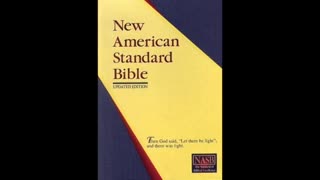Kebra Nagast - Chapters 37 to 47 - Oral Traditions of The Queen of Sheba
The Kebra Nagast - Chapters 37 to 47 read by Robert Eusini. Click "Show More" for chapter list.
00:00:07 - Chapter 37 - How Solomon Asked His Son Questions
00:04:37 - Chapter 38 - How The King Planned To Send Away His Son With The Nobles
00:08:45 - Chapter 39 - How They Made The Son of Solomon King
00:11:10 - Chapter 40 - How Zadok The Priest Gave Commands To David The King
00:16:11 - Chapter 41 - Concerning The Blessing of Kings
00:22:10 - Chapter 42 - Concerning The 10 Commandments
00:28:52 - Chapter 43 - How The Men of The Army of Israel Received Their Orders
00:35:08 - Chapter 44 - How It Is Not A Seemly Thing To Revile The King
00:39:29 - Chapter 45 - How Those Who Were Sent Away Wept and Made a Plan
00:46:18 - Chapter 46 - How They Made a Plan Concerning Zion
00:50:32 - Chapter 47 - Concerning The Offering of Azaryas (Azariah) and The King
The Kebra Nagast is an Ethiopian text. It is an oral tradition of the Queen of Sheba that was written down in the 4th century.
More details from SacredTexts: "This is a translation of the Kebra Nagast, a tremendous collection of Ethiopian Biblical folklore. The Kebra Nagast tells the legend of the Queen of Sheba's son by King Solomon, Menyelek (also known herein as Bayna-Lehkem and David II). Menyelek engineers a plot to take the Tabernacle of the Law of God (i.e., the Ark of the Covenant) to Ethiopia. This is done at the behest of an Angel of God who predicts the downfall of the kingdom of Solomon.
Committed to writing in the fourteenth century, the Kebra Nagast was derived from Ethiopian oral traditions of the Queen of Sheba and her state marriage with Solomon. The Kebra Nagast has been cited as one of the sources of the Rastafarian movement because of its support of Ethiopian theocracy.
Video produced by 31 Pearls, all rights reserved.
This video and/or audio may not be copied or reproduced in part or in whole.
℗31Pearls
-
 42:58
42:58
31 Pearls
5 months agoKebra Nagast - Chapters 53 to 60 - Oral Traditions of The Queen of Sheba
61 -
 37:17
37:17
CatholicReboot
8 months agoEpisode 1575: Books of the Bible - Ezra
185 -
 59:40
59:40
Bitcoin01
3 months agoThe Book of Nehemiah (NASB Audio Bible Non Dramatized)
40 -
 13:47
13:47
CatholicReboot
6 months ago $0.11 earnedEpisode 1714: Books of the Bible - Esther
1491 -
 1:21:07
1:21:07
Sdbiblestudy Church
4 months agoKEBRA NEGAST The Book of Kings 6 of 6
4 -
 1:02:15
1:02:15
Sdbiblestudy Church
4 months agoKEBRA NEGAST The Book of Kings 2 of 6
9 -
 1:17:54
1:17:54
Sdbiblestudy Church
4 months agoKEBRA NEGAST The Book of Kings 4 of 6
3 -
 1:15:01
1:15:01
Sdbiblestudy Church
4 months agoKEBRA NEGAST The Book of Kings 5 of 6
1 -
 57:26
57:26
Sdbiblestudy Church
4 months agoKEBRA NEGAST The Book of Kings 1 of 6
12 -
 11:50
11:50
CatholicReboot
6 months ago $0.05 earnedEpisode 1685: Books of the Bible - Judith
184